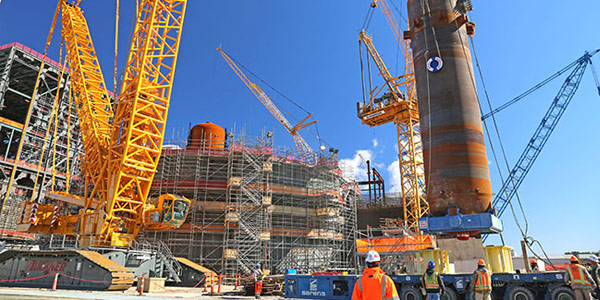By Rich Heidorn Jr.
Despite record-high capacity factors and reduced operating costs, the U.S. nuclear power industry is threatened by federal and state policies and an “increasingly distorted” energy market, Nuclear Energy Institute CEO Maria Korsnick said last week in her annual state of the industry address.
“Our capacity factor and generation has never been higher, and our operation costs have not been this low since 2004,” said Korsnick, citing the 2018 capacity factor of 92% and a 25% drop in “average total generating costs” since 2012. Nuclear power produced 20% of the nation’s electricity in 2018 and more than 55% of emissions-free power, she added.
But Korsnick said nuclear’s role in limiting carbon emissions is at risk from both RTO energy markets that fail to compensate them fairly and renewable portfolio standards in more than half of the states that limit their carbon-free technologies to wind and solar. “They ignore nuclear, and that’s shortsighted,” she said.
‘Not a Bailout’
She noted that the Nature Conservancy and the Union of Concerned Scientists have become more supportive of nuclear power, calling it a recognition of nuclear’s role as the “workhorse” of emission-free generation.
“I think it’s a realization that this idea of 100% renewables is not gonna happen,” she said in a Q&A session with NEI’s senior director of external communications, Monica Trauzzi. (Although Trauzzi asked some questions from viewers, Korsnick did not take questions from the media.)
Korsnick praised state officials in Illinois, New York, New Jersey and Connecticut, who have authorized new revenue streams to keep their nuclear plants operating, while noting that 12 plants nationwide are planning early retirements. (See related story, Clock Ticking on Pa. Nuke Subsidy Bill Hearings.)
“Saving nuclear plants is not a bailout. It is not a subsidy. It’s helping to right wrongs in an increasingly distorted energy market,” she said.
Korsnick said the industry also is at risk of losing its competitiveness internationally, saying two-thirds of the reactors being built around the world are from China or Russia. She called on Congress to reauthorize the Export-Import Bank and restore its quorum to ensure the financing needed to compete internationally.
Bright Times Ahead?
Korsnick was nevertheless optimistic about the future, saying 2020 could see the Nuclear Regulatory Commission approve its first application to renew a plant license for a second time; it would add a second 20-year extension, for a total of 80 years. Next year also could see NRC certification of NuScale’s design for a small modular reactor.
NEI has high hopes for bipartisan legislation introduced last week to create public-private partnerships to develop, test and deploy new nuclear technologies. It follows President Trump’s signing in January of the Nuclear Energy Innovation and Modernization Act, which seeks to accelerate the development of new reactor designs.
Korsnick said she was hopeful NRC’s Transformation Initiative would result in “off ramps” that allow the commission to terminate proceedings involving issues of “low-safety significance.”
The Electric Power Research Institute “came out with a report recently and mentioned that the current designs … are over 100 times safer than the original safety goals that the NRC set many years ago. … The industry is mature,” she said. “Let’s come up with ways — we’re calling it off ramps — so that we’re not spending an inordinate amount of time … churning on an issue that quite frankly just has low safety significance.”
Korsnick’s speech came the day before the 40th anniversary of the partial meltdown at Three Mile Island, which ended the expansion of nuclear power in the U.S. for decades.
Vogtle Milestone
Korsnick celebrated progress on Georgia Power’s Vogtle plant, which reached a milestone March 22 with the installation of the containment cap on Unit 3. Vogtle will be the first new U.S. nuclear plant built in three decades.
She did not mention the delays and massive cost overruns that have plagued Vogtle, and which led to the cancellation of a nuclear project in South Carolina. She said only that “massive infrastructure projects are always messy. They don’t always go as planned.”
In 2008, Georgia Power estimated that Vogtle Units 3 and 4 would cost $14.3 billion and begin commercial operations in 2016 and 2017, respectively. The most recent estimates put the total cost at about $28 billion and the completion dates in November 2021 and November 2022, according to Taxpayers for Common Sense.
The Department of Energy last month approved an additional $3.7 billion in loan guarantees for the project, bringing total taxpayer liabilities to more than $12 billion, the taxpayers group said.






